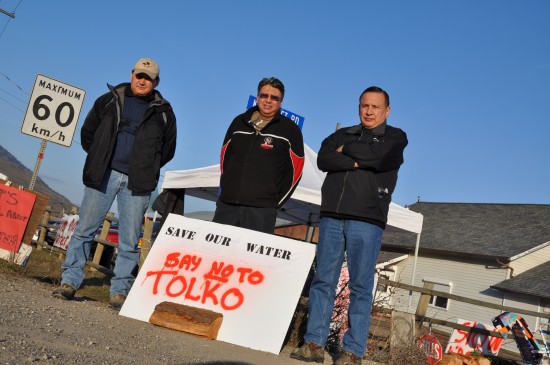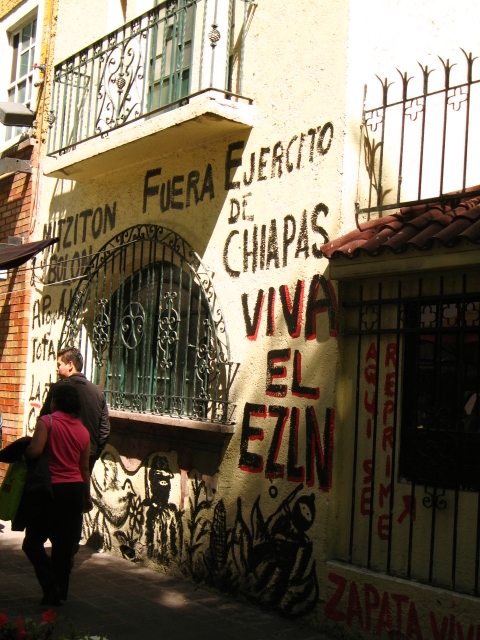February 23, 2010 – When 5,000 indigenous Dongria Kondhs trekked Sunday to Niyam Dongar hill, the abode of their presiding deity Niyam Raja, and designated it as inviolate, it meant they were stepping up their resistance to a controversial alumina refinery and bauxite mine project here.
They carried out religious rituals to Niyam Raja – the sacred dispenser of law, and then put up a totem pole in the area located in Niyamgiri hills in their homeland Lanjigarh, a bauxite-rich hilly area in Kalahandi of Orissa state in eastern India.
This was the latest act of defiance here against the backdrop of unrest since 1997 among communities, environmental and rights activists over the 2.13 billon U.S. dollar mining project by Vedanta Aluminium Ltd, the Indian arm of London-based Vedanta Resources Plc.
The alumina refinery, capable of producing one million tonnes of alumina from bauxite per annum, has been operating for over a year now at the foothills of Niyamgiri. Alumina is used in the production of aluminium metal.
Since 2007, Vedanta has been seeking clearance for a six-fold expansion of its refinery and 721-hectare bauxite mining project. The bauxite project however has been stalled by a forest law.
The mining operations would affect some 8,000 Dongria, Kutia and Jharania Kondh in 112 tribal and dalit villages in Kalahandi and adjacent Rayagada district, two of the most underdeveloped areas in Orissa.
For the forest-dwelling locals, Vedanta’s mining project would result in the demolition of the Dongria’s centuries-old sacred grove on Niyamgiri, threatening their ancient way of life, right to water, food, livelihood and cultural identity.
“These villages never had basic amenities like medical facilities, drinking water and properly functioning schools. The mining project will now take away even the sources of livelihood from them,” explained Dadhi Pusika, leader of Niyamgiri Surakhya Samity (Nayamgiri Protection Committee) that was formed by members of affected villages.
“Life is so hard. Old women and children are dying. They are living like dogs,” said 45-year-old Ladha Sikaka of Lakpaddar village, referring to the impact of the alumna refinery.
Six people from Rengopalli and villages near the refinery and its huge red mud pond – a receptacle of wastewater that is a mix of highly toxic alkaline chemicals and heavy metals – have died over the past year from undiagnosed respiratory ailments.
The Orissa State Pollution Control Board has issued several warnings to Vedanta since its refinery trial started in 2006, calling its attention to the shoddy protective lining of the red mud pond that leeches wastewater into Vamsadhara river flowing next to it. Villagers use that water for drinking.
Skin rashes and sores are common among residents. Some 40,000 truckloads of bauxite are transported to the refinery from outside Orissa per year, creating colossal air pollution from dirt roads, says Bhubaneswar-based environmentalist Biswajit Mohanty.
“If the mountain remains, our children remain, rains come, winter comes, the wind blows – the mountain will bring all the water, crops will grow. If they take away the rocks, water will dry, we will die,” said Ladha. “The mountain is our soul, we will lose our soul.”
“We cannot allow mining even if we are beheaded,” he added.
The Dongria’s Sunday protest comes on the heels of Amnesty International’s recent report on the Vedanta project, called ‘Don’t Mine Us Out of Existence’. The report alleges that 12 pollution-affected villages have never received direct information on the refinery.
Green activists say the gravest concern pertains to water. Hilltop mining will dry up perennial water sources, while possible poor management of refinery wastewater could degrade surface water and pollute groundwater too. There is also concern about the huge quantities of water that the expanded refinery will consume daily.
An expansion of the current Vedanta project would mean its bauxite requirement would jump from three to 18 million tonnes per annum, resulting in not just one but possibly several open-cast mines on Niyamgiri.
But Vedanta clarifies that its mineralisation area of three million tonne per annum is mere 3.5 percent of 250 square-kilometre hill range, and that its 30-metre deep excavations would not disturb the water table 78 metres below ground level.
Three rivers, Vamsadhara, Sakota and Nagavalli, flow four, 7.5 and 13 km respectively from the mine’s buffer zone, as do perennial streams. The larger rivers provide drinking water and irrigation to hundreds of thousands in Kalahandi, Rayagada and the neighbouring state of Andhra Pradesh. Watchdog groups point out that excavation will destroy the hills’ water recharging capacity because the porousness of the bauxite layer increases water retention. This will eventually kill the rivers, make the habitat drier and affect agriculture, wild vegetation and pasture, they add.
Pavan Kaushik, head of corporate communications for Vedanta group, countered this in earlier letter to journalists. “Bauxite extraction… removes a hard rocky layer called laterite which will allow rain water to percolate deep… increasing afforestation post-mining.”
Flash floods, which are common here, will be aggravated by hilltop deforestation. A flash flood in Vamsadhara can breach the red mud pond, causing disastrous wastewater spills into the river.
Three-quarters of the targeted hill have thick forests. The 300 species of plants in them include 50 species of medicinal plants and trees, six of which are in the International Union for Conservation of Nature Red List of threatened species. An elephant reserve, the forests are home to tigers, leopards, barking deer.
A tribal woman from Sindhabahal said, “The forest gives leaves, bamboo, roots, medicinal herbs, fruits, juice from the giant palm trees (to make liquor). These we sell or use for food. Hill slopes, known as ‘dongar’, are our cultivation fields.”
Local will have nothing less than the cancellation of Vedanta’s Niyamgiri mining lease.
They want the India Forest Rights Act of 2006, which gives forest-dwelling communities rights to land and other resources, implemented. They have demanded an irrigation dam from perennial hill streams, schools in each and one hospital for every 10 large villages, assured daily wage work under government schemes and support prices for forest products.
“The government is largely satisfied with its (Vedanta) pollution control measures at this time,” said a senior official of the Orissa government, Vedanta’s stake-holding partner, who spoke to IPS on condition of anonymity because “Vedanta has become a political issue”.
But “Vedanta’s corporate social responsibility however needs to shape up,” he underscored.
In an email reply to IPS, Mukesh Kumar, Vedanta’s chief operating officer at Lanjigarh, says that his company believes in sustainable development. “It is providing livelihood to tribal people through vegetable cultivation, pisciculture, poultry and goatery. Nutrition to children, health check-ups and malaria control are other programmes. Direct and indirect employment has been given to 20,000 people while 13 villages now have electricity,” he added.
Meantime, the London-listed mining major Vedanta Resources Plc has been seeing international investors sell their stakes in it due to ethical concerns over the Orissa project. Britain’s Joseph Rowntree Charitable Trust is the latest to leave, after the Church of England, the Norwegian government and Martin Currie Investment Management.
Said woman tribal leader Kulunji Sikhola: “It is our land; we will sit – the Dongria people – and decide directly”.


 22.02.2010
22.02.2010 On 6th February 230 civilian Zapatistas took part in an action to retake control of their reclaimed lands at Bolon Ajaw, Chiapas, Mexico, which had been invaded and taken over since 20 January by the paramilitary group OPDDIC, report the human rights group Fray Bartolome de Las Casas. The 25 Zapatista families of Bolon Ajaw, part of autonomous municipality Comandanta Ramona, were given solidarity by Zapatistas from further afield.
On 6th February 230 civilian Zapatistas took part in an action to retake control of their reclaimed lands at Bolon Ajaw, Chiapas, Mexico, which had been invaded and taken over since 20 January by the paramilitary group OPDDIC, report the human rights group Fray Bartolome de Las Casas. The 25 Zapatista families of Bolon Ajaw, part of autonomous municipality Comandanta Ramona, were given solidarity by Zapatistas from further afield.